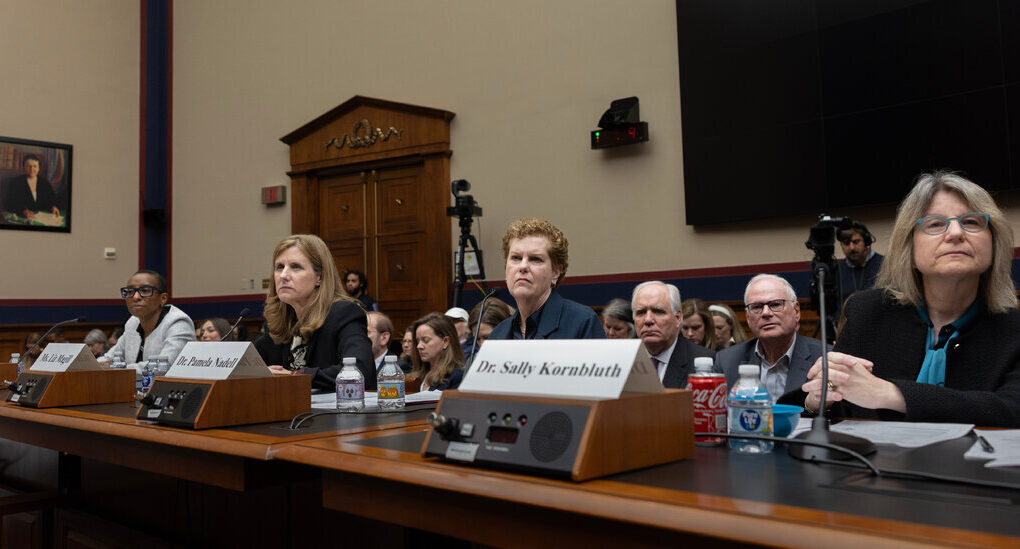At a congressional hearing on Tuesday, the leaders of Harvard, the University of Pennsylvania and the Massachusetts Institute of Technology gave carefully worded — and seemingly evasive — answers to the question of whether they would discipline students who called for the genocide of Jews. The intense criticism that followed led many to wonder: Who had prepared them for testimony?
It turns out that one of America’s best known white-shoe law firms, WilmerHale, was intricately involved.
Two of the school presidents, Claudine Gay of Harvard and Elizabeth Magill of Penn, prepared separately for the congressional testimony with teams from WilmerHale, according to two people familiar with the situation who asked not to be identified because the preparation process is confidential.
WilmerHale also had a meeting with M.I.T.’s president, Sally Kornbluth, one of the people said.
On Saturday, Ms. Magill resigned as Penn’s president after the fallout from her congressional testimony became overwhelming.
WilmerHale, created by a merger in 2004 between Wilmer Cutler Pickering of Washington and Hale and Dorr of Boston, has offices across the United States, Europe and Asia. It is best known in the legal industry for defending clients facing government investigations and enforcement. Among its best-known clients have been the oil giant BP PLC, which the law firm represented during government investigations after an oil spill in the Gulf of Mexico, and President Richard Nixon, whom it represented in his fight with Congress over the Watergate tapes.
It also has an extensive practice working with universities.
Lawyers for WilmerHale sat in the front row at the hearing on Tuesday. They included Alyssa DaCunha, who leads the firm’s congressional investigations and crisis management practices, and Felicia Ellsworth, the vice chair of the firm’s litigation and controversy department.
Both Ms. DaCunha and Ms. Ellsworth were involved in preparing the presidents of Harvard and Penn for the hearings, one person familiar with the process said. The schools each independently hired WilmerHale, and the firm created separate teams to prepare each president. The firm already had ties with all three schools.
A spokeswoman for the firm declined to comment.
Preparing for congressional testimony involves blending legal caution with political savvy and common sense, legal experts say. Lawyers typically advise those testifying to be mindful of the law but to also consider headlines that could come out of the hearing. That can be a difficult task after hours of pointed questioning.
“I got caught up in what had become at that point, an extended, combative exchange about policies and procedures,” Dr. Gay told The Harvard Crimson.
Steven Davidoff Solomon, a professor at the University of California, Berkeley, School of Law, said that the college presidents appeared to be “prepared to give answers in the court — and not a public forum.”
But the responsibility of university presidents, Mr. Solomon said, is “not to give legal answers, it’s to give the vision of the university.”
In one of the most charged moments of testimony, Representative Elise Stefanik, Republican of New York, asked the three presidents whether calls for violence against Jews would violate their school’s code of conduct.
Dr. Kornbluth of M.I.T. responded that they might, “if targeted at individuals, not making public statements.” Ms. Magill of Penn said a call for violence against Jews could be considered a violation “if it is directed and severe, pervasive, it is harassment.” When pushed to answer yes or no, she responded, “it is a context-dependent decision.” And Dr. Gay of Harvard responded, “It can be, depending on the context.”
The responses immediately set off a flurry of criticism. A House committee opened an investigation into the three institutions, and a donor clawed back a large donation to Penn. A day after Wharton’s board of advisers called for Ms. Magill’s resignation, Wharton’s undergraduate executive board issued a statement on Friday in support of the change in leadership.
Critics said the answers appeared to be too focused on whether conduct would violate the First Amendment.
“Once they were in that box, I think they stuck with their preparation,” said Edward Rock, a professor of law at New York University. “That’s why they came across so wooden. And then, afterward, they realized it was a terrible answer.”
Dr. Gay of Harvard issued a clarification on Wednesday: “Let me be clear: Calls for violence or genocide against the Jewish community, or any religious or ethnic group, are vile. They have no place at Harvard, and those who threaten our Jewish students will be held to account.”
Ms. Magill of Penn said in a video, “I was not focused on, but I should have been, the irrefutable fact that a call for genocide of Jewish people is a call for some of the most terrible violence human beings can perpetrate.”



